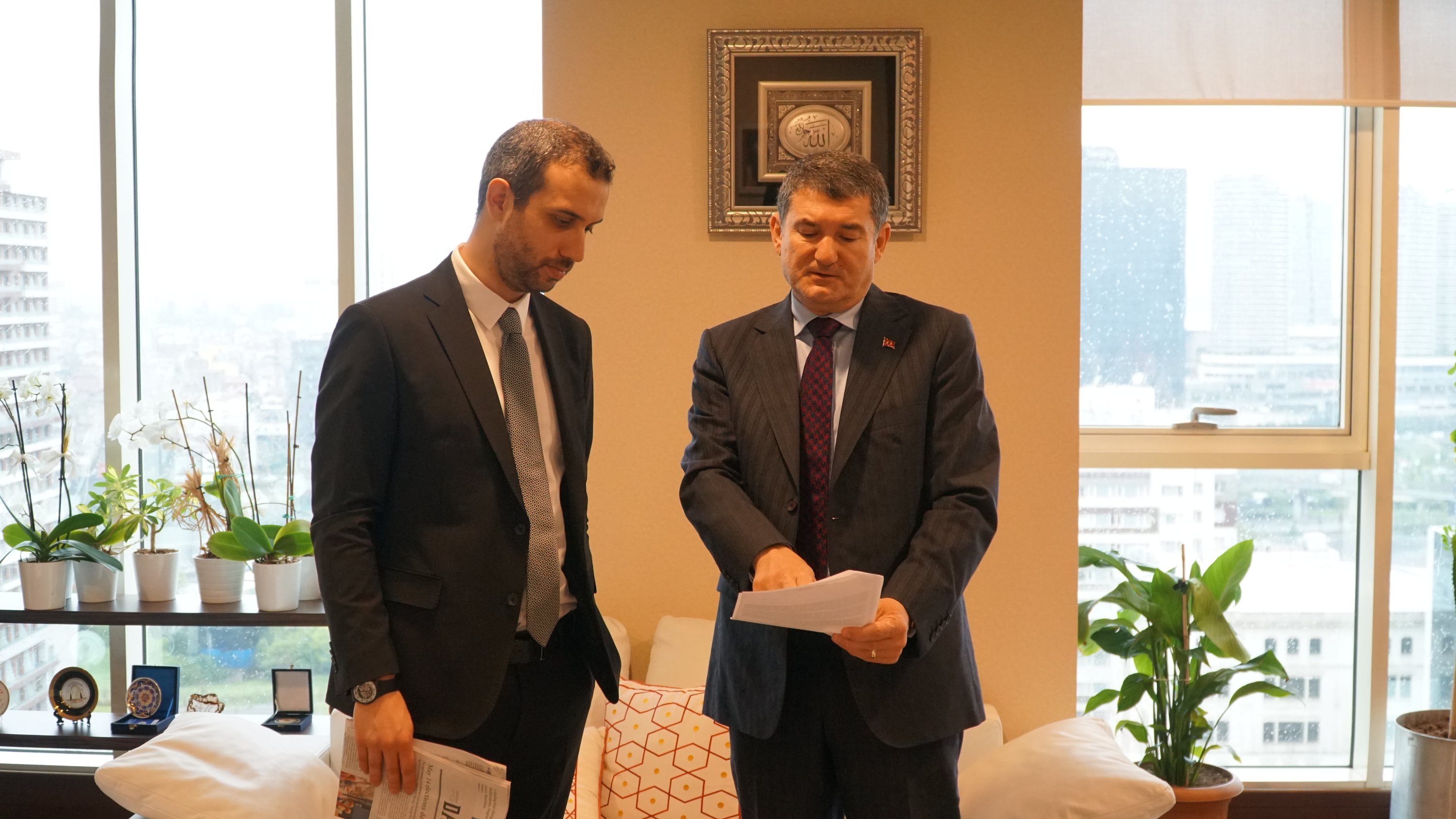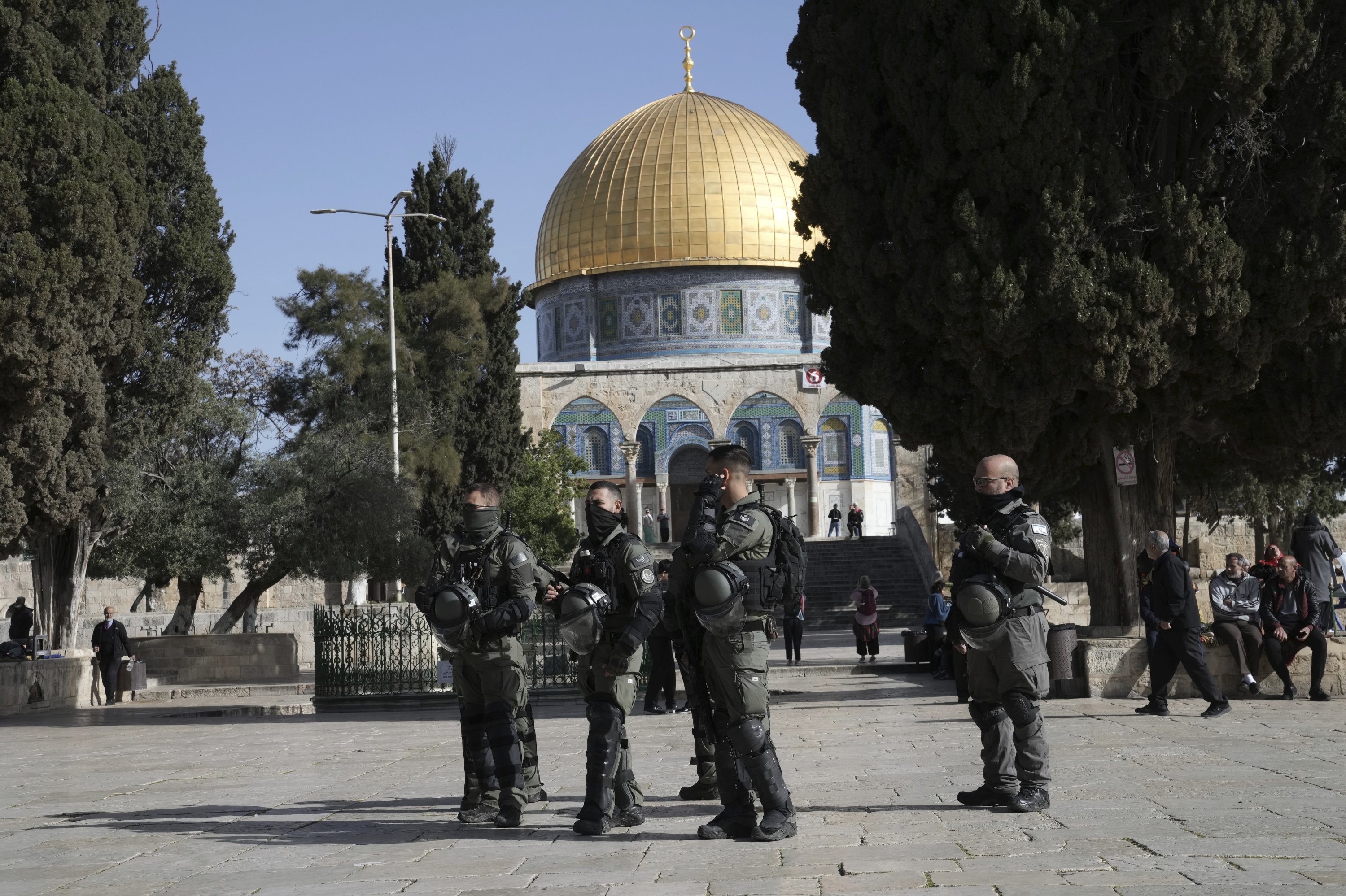© Turkuvaz Haberleşme ve Yayıncılık 2026
As Türkiye gears up for its highly anticipated presidential and parliamentary elections on May 14, the world is keeping a close eye on its foreign policy trends. The global community is eager to see whether the outcome of the election will bring about a seismic shift in Türkiye's diplomatic approaches. Despite Ankara's multifaceted policies on a range of geopolitical issues such as Syria, NATO, Russia and the Gulf, observers particularly wonder about its position on Israel and how this may influence the broader Middle East region.
According to Çağrı Erhan, a member of Türkiye's Presidential Security and Foreign Policy Committee, “The diplomatic relations between Türkiye and Israel have remained unbroken, and there is no likelihood of any radical changes in the foreseeable future.”
In a recent exclusive interview with Daily Sabah, Professor Erhan, a well-known foreign policy expert and the rector of Altınbaş University in Istanbul, highlighted that, “Despite the bilateral ties experiencing some turbulence since 1949, both nations have consistently maintained a stable and optimal balance without any drastic alterations.”
Türkiye officially recognized Israel as a state on March 28, 1949, approximately a year after Israel declared its independence in May 1948. Türkiye's recognition was a notable milestone in the Muslim world, with Egypt following suit in 1979 and Jordan in 1994.
According to the scholar, whose latest book is titled "The Establishment of Türkiye-Israel Diplomatic Relations," both countries prioritize their respective national interests in shaping their relationship.
“This viewpoint is supported by extensive evidence from state archives and memoirs of statesmen,” he said and shared an intriguing anecdote from his research, underscoring this point.
In 1958, two years after the Second Arab-Israeli war, also known as the Suez Crisis, the then-Turkish foreign minister, Fatin Rüştü Zorlu, met twice with his Israeli counterpart, Golda Meir, once in Rome and once in Zurich. This meeting occurred at a time when Ankara appeared to be at odds with Tel Aviv, having withdrawn its ambassador, condemned Tel Aviv for the Suez development and supported Cairo in the face of the crisis.

"It was known that (then-Turkish Prime Minister Adnan) Menderes and (his Israeli counterpart David) Ben-Gurion met on Aug. 28, 1958. However, no one knew that they had talked," he said. "We now understand that the meeting took place after the Zorlu-Meir gathering in the European cities, and the two leaders discussed a military alliance."
According to some experts, the alliance highlighted by the professor is considered a "phantom alliance" – a signal of Türkiye-Israel rapprochement against Egypt's then-President Gamal Abdel Nasser Hussein during those years.
Erhan asserts that the archival records referred to are solid evidence of how Ankara and Tel Aviv have smartly navigated the complex Middle Eastern landscape to safeguard their respective national interests. Despite the region's “chaotic” nature, both nations have remained resolute in their pursuit of strategic goals.
"The nature of the Türkiye-Israel relations is marked by three levels," explained the professor. "These include the Türkiye-U.S. relationship, regional dynamics and domestic politics."
Erhan emphasized that the communication between Ankara and Washington is a decisive factor in the communication between Ankara and Tel Aviv. "Positive Türkiye-Israel ties almost always have a U.S. connection," he stated.
Erhan went on to say that the Jewish lobby in America is extremely influential and can strengthen Türkiye's position when necessary in the U.S. "The Jewish lobby's support has been beneficial for Türkiye in various cases, such as the Armenian issue, Greek claims, arms purchases and sanctions," he revealed.
"After the infamous Mavi Marmara incident, the Jewish lobby changed its stance and left Türkiye vulnerable in the U.S. They supported controversial decisions made against Türkiye, such as the Countering America's Adversaries Through Sanctions Act (CAATSA) sanctions," he noted.
The Mavi Marmara incident, described as a moment that caused Turkish-Israeli ties to hit rock bottom, was a violent confrontation that occurred on May 31, 2010, when the Israeli military intercepted a flotilla of six ships, including the Mavi Marmara, attempting to deliver humanitarian aid to the Gaza Strip. The Mavi Marmara was carrying mostly Turkish activists and was the largest ship in the flotilla.

As the Israeli soldiers boarded the ship to enforce a naval blockade, they were met with resistance from some of the activists on board. Nine Turkish activists were killed and several were wounded. The incident sparked international condemnation. A United Nations investigation into the incident found that Israel's use of force was excessive and unreasonable and that the naval blockade of Gaza was illegal under international law.
"State archives demonstrate that Turkish foreign policy makers have always taken the Jewish lobby's position into consideration when discussing cooperation with the U.S.," Erhan said. "This attitude has been consistent across all Turkish governments, from secular to conservative."
Erhan stressed, "Turks understand that without the support of the Jewish lobby, it may not be impossible, but it will be difficult to further improve ties with Washington."
Secondly, according to the professor, regional dynamics play an influential role. "Whenever Türkiye has tensions with its neighbors or regional states, it automatically causes Israeli normalization," he stated, making a reference to the 1958 Menderes-Ben-Gurion meeting.
To support his argument on regional impacts, Erhan also cited an agreement signed by the Necmettin Erbakan government in Türkiye against Syria. During his tenure in the 1990s, Prime Minister Erbakan signed a military training deal with Tel Aviv against Damascus, as the latter was supporting PKK terrorist elements and Greece, and there was a water crisis too.
According to Erhan, Iran is also another significant regional dynamic that shapes Israeli foreign policy. "Whenever Israel faces a threat from Iran, it turns to the Arab world and Türkiye."
The relations between Israel and Iran are extremely strained and hostile. The two countries have a long history of animosity and conflict dating back to the Islamic Revolution in Iran in 1979, which led to the establishment of an Islamic republic with a strong anti-Israel stance. Since then, Iran has been a major supporter of various anti-Israel groups, including Hamas and Hezbollah, and has frequently called for the destruction of Israel.
Israel, for its part, has long viewed Iran as a significant threat to its security. Israel believes that Iran is pursuing nuclear weapons and has been highly critical of the 2015 Joint Comprehensive Plan of Action (JCPOA), a deal designed to limit Iran's nuclear program in exchange for lifting economic sanctions.
Tensions between the two countries have escalated in recent years, with both sides engaging in hostile rhetoric and occasional military action.
Commenting on the recent normalization attempts by Turkish and Israeli officials, the professor defined the second Karabakh war as the most updated regional dynamic that changed the ties. "(Azerbaijani President Ilham) Aliyev had a big role in it," he said.

In the South Caucasus conflict, Ankara and Tel Aviv openly provided support to Baku in its struggle against Yerevan to regain its occupied lands. According to experts, the reason behind Israel’s support is Iran, an archrival of the former. Seeking to build a closer relationship with Baku, Tel Aviv, which also hosts a strong Azerbaijani diaspora in its land, provided support against Yerevan.
Thirdly, Erhan pointed out the impact of domestic politics on diplomacy and gave an example of Israeli Prime Minister Benjamin Netanyahu's recent attacks on Al-Aqsa and Gaza. In early April, Israeli police raided the Al-Aqsa Mosque compound in occupied East Jerusalem, arresting hundreds of Muslim worshippers and attacking them with batons and rubber bullets. Gaza was also bombed. President Recep Tayyip Erdoğan reiterated Türkiye’s position and said it was a "red line" for his country.
Erhan links the recent series of Israeli attacks to Netanyahu's troubles at home.
Netanyahu has been facing legal challenges for several years, including accusations of corruption, fraud and breach of trust in multiple cases, which have led to a political crisis in the country.
"When he was cornered by mass social reactions, he attacked Al-Aqsa, Gaza, Lebanon and even Syria to mobilize the nation and garner their support," the professor said.
However, according to him, while Netanyahu's attacks helped him at home, they caused problems outside, including ties with Türkiye.
"Whenever Israel brutally storms into the Al-Aqsa Mosque, bombs Gaza Strip or takes steps to remove Palestinians from their lands, it sparks anger and reactions among Turkish people," Erhan said.

"This is independent of politics. Every segment of Turkish society, from left to right, is against the Israeli occupation of Palestine. It's not related to the (ruling Justice and Development Party) AK Party era."
It is known that some Turkish leftists participated in armed training programs in Palestinian camps in the 1960s, and some of them were even imprisoned in Israeli jails.
According to Erhan, the end of bloc politics in the world, which diplomats say has gradually occurred over the past 30 years, is being felt in Turkish and Israeli foreign policy strategies.
"Both nations cross paths in line with political and diplomatic conjunctures," he said, adding that: "Türkiye pursues close economic relations with Russia or buys S-400 missile systems while securing its strong position in NATO. It conducts a series of business with China, while Beijing poses a threat to the Western bloc with its rise in the Middle East."
Erhan noted that the same approach is observed in Israel. "Israel is not completely a partner to a specific bloc either. With the special guarantee provided by the U.S., Israel violates international law and ignores U.N. resolutions."
"The end of bloc politics is being felt almost everywhere," he concluded, emphasizing that, "There is no black or white in world diplomacy today; countries sometimes clash, sometimes not. It depends on the specific cases and should be evaluated as such."
"However, in the minds of Turkish and Israeli officials, there are some questions that need answers, with the security issue topping this list," the Turkish academic said.
He stated that Turks are asking what Israelis are trying to achieve in their Iraq and Iran policies through their policies with non-state actors in the region. Israel is reportedly known for sometimes negotiating with regional elements deemed a "threat to national security" by Ankara. "This situation raises doubts among Turkish minds," Erhan pointed.
Türkiye is closely following its neighboring areas as it has faced a terror threat for over 40 years. From Iraq to Iran, the PKK and its linked formations pursue their agenda of aiming to damage Turkish sovereignty.
"For Israel, the support of some circles in Türkiye of armed Palestinian groups is defined as 'unacceptable,'" Erhan said and highlighted that, "The support or similar attempts to legitimize some groups, described as illegal by Israel, raise questions in Israeli minds."
Erhan added that Türkiye also strongly opposes the Israeli lobby's support for some U.S. senators trying to corner Türkiye through sanctions. "This situation remains a big minus for positive ties," he said.
"The absence of anti-Semitism in Türkiye is a plus, for example," he expressed.
Although Türkiye is predominantly a Muslim country, it has a long history of tolerance and acceptance toward people of all religions, including Judaism. The country has a sizable Jewish community that has lived on its soil for centuries and has been an integral part of its society and culture.
Despite the prevalence of anti-Semitism in other parts of the world, Türkiye has largely been free from such prejudices. The country's Constitution and laws explicitly protect the rights of all its citizens, including those of Jewish descent. The incumbent Turkish administration has also taken active steps to preserve the country's Jewish heritage, such as restoring synagogues and cemeteries.
The Great Edirne Synagogue, also known as Kal Kadoş ha Gadol, reopened in the northwestern Turkish province of Edirne in March 2015 after undergoing a four-year restoration. The landmark move was seen as a symbol of Türkiye's commitment to protecting its multicultural heritage and promoting religious tolerance.
Historically, Türkiye has been a haven for Jews fleeing persecution in other countries. During World War II, the Turkish government welcomed Jewish refugees from Europe and the Middle East, providing them safe passage and shelter.
"It is evidently known that some Nazis paid some writers and cartoonists to spread anti-Semitism propaganda in Türkiye during the World War II period. The Turkish government, however, managed to defuse such attempts," Erhan said.
According to the Turkish expert, there are limitations to what Türkiye and Israel can achieve together based on numerical information such as population, national income and others. However, he believes there are common projects that both countries can collaborate on.
“The joint projects, such as agriculture in Karabakh, can be one of them,” he said. “Israel has know-how in agricultural technology. With Türkiye's assistance, they can help Azerbaijan revive the areas damaged by Armenia’s land mines.”
Erhan also thinks the high-tech sector is a good field for the two countries to invest in. “Israel’s capacity in software programming or Türkiye’s know-how in manufacturing drones and electric vehicles can be a good and quick start to boost investments."
